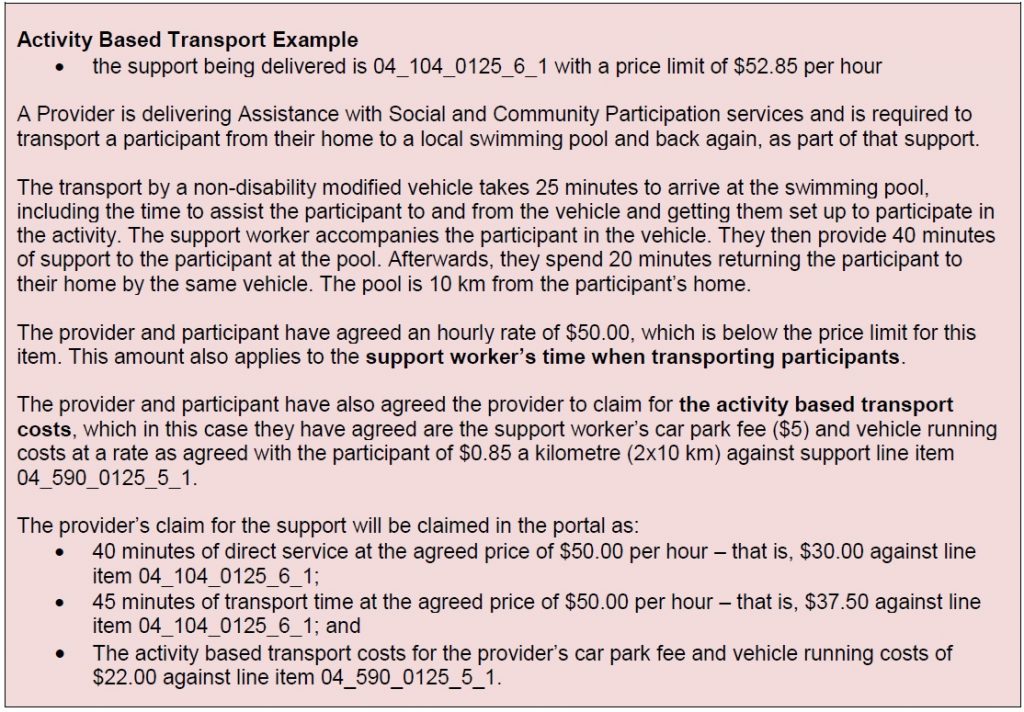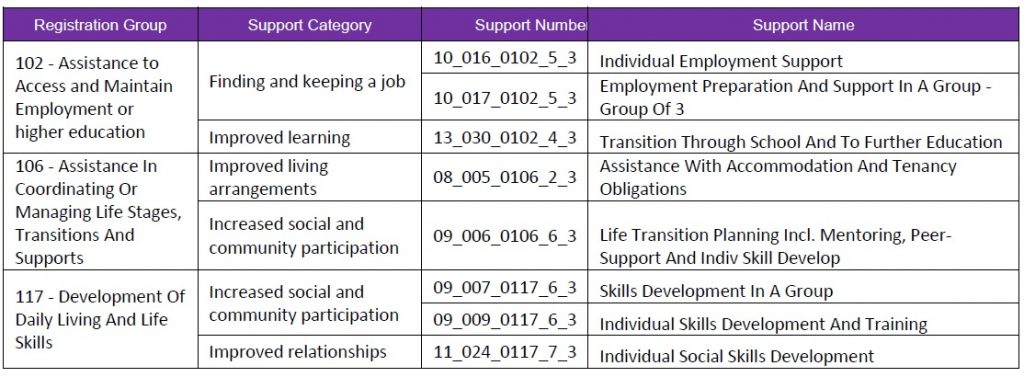There has been much discussion in the disability supports market, after the Minister announced more flexibility and increased choice for participants accessing transport funding in their plans on the 3rd of February 2020.
The NDIA has today released a new NDIS Price Guide and Support Catalogue effective 1 March 2020. This update provides the much needed clarity and operational detail, introducing nine activity-based transport items. The new guide and catalogue can be found on the NDIS website, direct file links below:
- Price Guide 2019-20 (PDF 1MB) or Price Guide 2019-20 (DOCX 189KB)
- Support Catalogue 2019-20 (PDF 1.7MB) or Support Catalogue 2019-20 (CSV 241KB) or Support Catalogue 2019-20 (XLSX 197KB)
The NDIA’s release to providers stated
“This increases flexibility for participants to exercise choice and control over their transport. Providers will also find it easier to claim non-labour transport costs incurred when transporting or accompanying participants to and from activities in the community, including assistance to access and maintain employment or higher education.”
“Non-labour costs associated with participant transport can include public transport fares, road tolls, parking fees, reasonable vehicle running costs and taxi or ride-share fares.”
“While these items are not price-controlled, the NDIS Price Guide (effective 1 March 2020) outlines a reasonable level of non-labour costs.”
The detail from the Price Guide (p.16)
General Transport Supports
General Transport supports are supports where a participant pays a provider to transport them to an activity that is not itself a support – or to a support that is delivered by another provider. This enables the participant to travel to and from appointments or their place of work.
Providers registered for Assistance with Travel/Transport Arrangements (Registration Group 0108) can, with the agreement of the participant, make a claim against a participant’s transport budget for the cost of any general transport supports that they provide to participants.
Activity Based Transport – Community Participation Supports
Providers of community participation supports may, at the request of a participant, transport a participant to, or from, or as part of, a community participation support. In these cases, the provider is entitled, with the agreement of the participant, to bill the participant’s plan for the time that support workers spend providing the transport support (as part of the community participation support). They are also entitled to bill for any non-labour costs associated with transporting the participant (again, as part of the community participation support).
The worker’s time can be claimed at the agreed hourly rate for the relevant support item for the total time the worker provides support to one or more participants, including time spent accompanying and/or transporting the participant. Where a provider is transporting two or more participants on the same trip, the worker’s time should be claimed at the appropriate group rate for the relevant support. This claim should be made using the relevant community participation support item and against the participant’s core budget. In essence, the employee’s time to transport, or to accompany, the participant to the community participation support is a part of the community participation activity and should be billed accordingly.
If a provider incurs costs, in addition to the cost of a worker’s time, when accompanying and/or transporting participants in the community (such as road tolls, parking fees and the running costs of the vehicle), they may negotiate with the participant for them to make a reasonable contribution towards these costs. The NDIA considers that the following would be reasonable contributions:
- up to $0.85 a kilometre for a vehicle that is not modified for accessibility
- up to $2.40 a kilometre for a vehicle that is modified for accessibility or a bus
- other forms of transport or associated costs up to the full amount, such as road tolls, parking, public transport fares.
These non-labour costs should be claimed against the relevant activity based transport support item in the community participation support category.

Activity Based Transport – Capacity Building Supports
Providers of the following capacity building line items are also permitted to claim for Activity Based Transport when delivering those supports if necessary.

Note: Providers of SLES supports cannot bill for Activity Based Transport related to the delivery of the supports. SLES items are not price controlled and providers are able to incorporate associated costs of transport into allocated funding for the support itself.
Further clarity from the NDIA
The NDIA has released further clarity on this price guide implementation for transport on their website.
Participant transport What has changed?
From March 2020, you can use your plan’s support funding to pay registered providers transport costs when they are transporting you to and from a number of community activities funded in your NDIS plan including employment and higher education.
While these are not price controlled, the NDIS Price Guide outlines reasonable levels of costs that providers can claim for. These include:
- up to $0.85 a kilometre for a vehicle that is not modified for accessibility
- up to $2.40 a kilometre for a vehicle that is modified for accessibility or a bus
- other forms of transport or associated costs up to the full amount, such as road tolls, parking, public transport fares
This does not allow for payment of fines or other similar costs.
How does it affect me?
You can now use your budget flexibly to pay registered providers for their transport costs when they are transporting you to and from a number of community activities, and selected capacity building activities where they are funded in your plan.
Providers can claim these costs through the myplace provider portal.
This means you can continue to access your community-based supports, employment supports and higher education supports because registered providers can claim transport costs.
Your provider should discuss with you and explain any transport costs such as reasonable vehicle running costs or other associated costs before you are charged and before service bookings are updated.
If you have chosen to receive a periodic payment for transport, then that payment continues.
If you are concerned that you don’t have enough funds in your plan to cover transport costs, you may request a plan review.
What exactly are (and are not) “NDIS funded community activities”?
The Activity-based transport items listed in the NDIS Price Guide and Support Catalogue (effective 1 March 2020) which includes the following community-based activities :
- Assistance with social and community participation
- Improved living arrangements
- Increased social and community participation
- Finding and keeping a job
- Improved relationships
- Improved learning.
Can I use the funds for transport to go to doctor appointments?
Generally the answer is no, as medical appointments are usually personal activities, rather than a funded support within an NDIS plan.
Can I use the funds to go and see my friends?
No, this change is for selected capacity building supports and activity-based transports.
Is this only for people who have service providers? What if we don’t have a service provider but want to use some of our core funding for transport?
This announcement enables registered providers to submit payment requests to cover the transport costs they incur as part of transporting participants to and from community-based activities and selected capacity building supports. Participants funded for transport as a Core support can use their funding flexibly to book a transport provider.
Can I use my core funding to pay the difference between the taxi fare and my vouchers? Is that allowed?
Participants funded for transport as a Core support can use their funding flexibly to book a transport provider. Participants receiving transport funding as a periodic payment can also use those funds to pay the difference.
What happens if my provider charges more than 85 cents a kilometre?
While these items are not price-controlled, the Price Guide (effective 1 March 2020) outlines the reasonable level of these non-labour costs which participants and providers can use to discuss and agree on charges. Providers cannot charge more than participants have agreed to pay. Participants have choice and control over how they spend their NDIS funds and which providers they choose to deliver their services.

